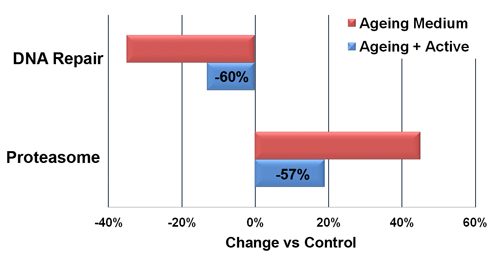The cosmetic industry is under ever increasing pressure from regulators and consumers to provide stronger scientific support for anti-ageing claims. Fortunately continual advances in our understanding of ageing mechanisms and how they can be investigated in detail in vitro are now providing a host of new opportunities for novel, strongly supported anti-ageing claims.
An example of these recent advances is the newly released second generation VitroAge™ model from CELLnTEC. The new VitroAge model achieves natural keratinocyte ageing without the synthetic pro-ageing chemicals or concentrated oxidisers required by traditional ageing models.
Natural ageing is achieved in just 3 weeks of culture by omitting the protective, anti-aging ingredients found in all standard culture media.
In the absence of anti-aging ingredients, keratinocytes grown in VitroAge medium display age-related changes in all the following cellular functions:
• Antioxidant
• Progenitor Cell Activity
• Redox Signaling
• Proteasome
• Protein Biosynthesis
• Adhesion
• DNA Repair
• Stress Responses
• Cell Cycle
These age-related processes can now be accurately analysed in parallel using multiplex proteomics to quantify 100 proteins in a single sample. With this data, it is possible to identify which ageing processes are most significantly slowed by an active ingredient (see example figure).

Active XY significantly slows the ageing process. Age-related changes to the Proteasome were decreased by 57%; changes to DNA repair mechanisms by 60%.
The VitroAge model combines an advanced in vitro model of natural ageing with powerful multiplex proteomic analysis. With this combination the model is ideally suited to the testing of novel anti-ageing strategies by the personal care industry, and the generation of advanced claims with strong scientific support.



